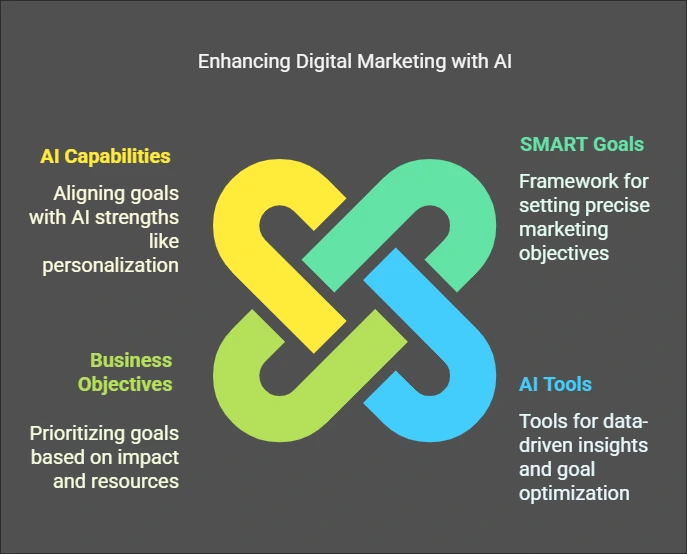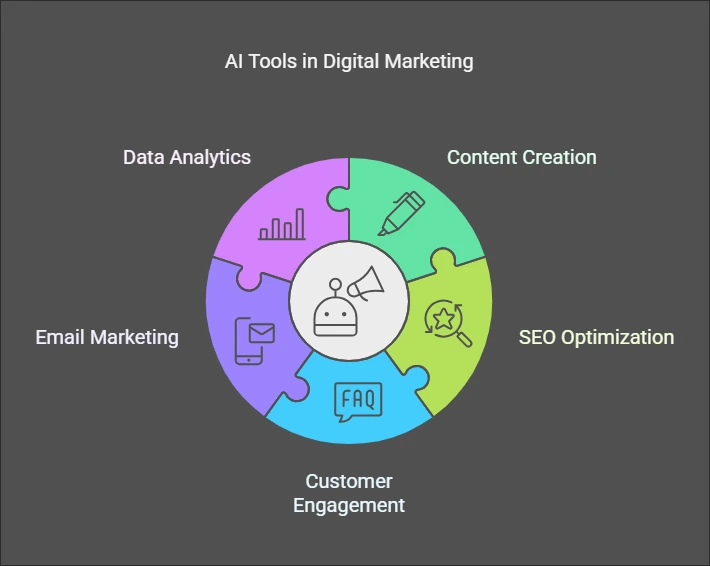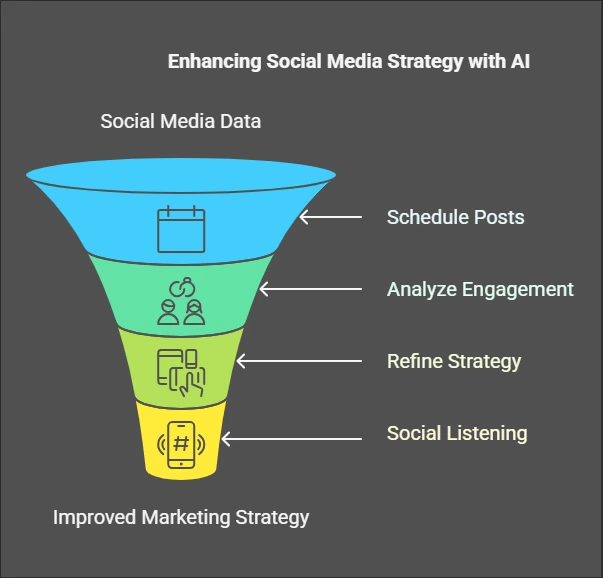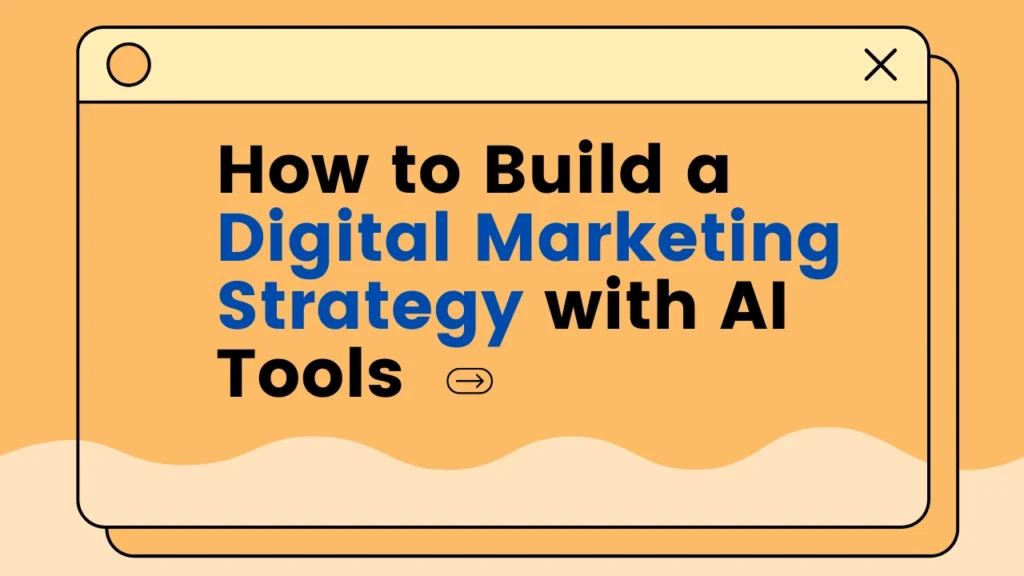Table of Contents
Love this post? Share it!
Introduction
In today’s fast-paced digital landscape, staying ahead of the curve requires more than just intuition and creativity—it demands innovation. The integration of Artificial Intelligence (AI) into digital marketing has opened up a world of possibilities, transforming how businesses connect with their audiences. Whether you’re a seasoned marketer or just starting out, understanding how to harness the power of AI can be a game-changer for your strategy.
This guide will take you on a journey to explore how AI is revolutionizing digital marketing, why a well-defined strategy is crucial, and the foundational elements you need to succeed.
What Is Digital Marketing in the Age of AI?
Digital marketing, at its core, involves promoting products and services through online platforms to reach a targeted audience. However, the age of AI has redefined what’s possible. With AI, marketers can now analyze data with unprecedented speed, predict customer behavior, and deliver hyper-personalized experiences. Imagine knowing exactly what your audience wants, when they want it, and how they prefer to engage—all without lifting a finger manually. AI makes this vision a reality, enabling marketers to work smarter, not harder.
Why AI Is Revolutionizing Digital Marketing
AI is not just a trend; it’s a revolution. It brings efficiency, precision, and scalability to marketing efforts in ways traditional methods never could. From automating mundane tasks like email scheduling to crafting compelling ad campaigns using predictive analytics, AI allows marketers to focus on strategic creativity. Moreover, AI tools can uncover hidden patterns in data, enabling businesses to make data-driven decisions that maximize ROI.
For example, AI-powered tools like ChatGPT can generate human-like content, while machine learning algorithms refine ad targeting for better conversion rates. These capabilities not only save time but also improve the overall quality and impact of marketing campaigns.
The Importance of a Well-Defined Strategy
While AI offers incredible potential, it’s only as effective as the strategy guiding its use. A scattergun approach to AI adoption can lead to wasted resources and missed opportunities. A well-defined digital marketing strategy ensures that every tool, tactic, and resource aligns with your business goals. It helps prioritize efforts, allocate budgets efficiently, and measure success accurately.
Without a clear roadmap, even the most advanced AI tools can fall short. That’s why understanding the basics and integrating AI thoughtfully into your strategy is crucial for success.
Want to leverage AI to build a profitable online business but don’t know where to start? 🚀 Our beginner-friendly guide walks you through everything you need to know to launch and scale with AI. Don’t miss out—grab your copy of “How to Build an AI-Powered Online Business: A Beginner’s Guide” today! 👉 Get your eBook now!
1. Understanding the Basics of Digital Marketing
What Is Digital Marketing?
Digital marketing refers to promoting products, services, or brands through digital channels like search engines, social media, email, and websites. Unlike traditional marketing, digital marketing thrives on interactivity and data, allowing businesses to engage directly with their audience and measure the success of their efforts in real-time.
Key Components of a Digital Marketing Strategy
A robust digital marketing strategy typically includes:
- Search Engine Optimization (SEO): Ensuring your content ranks high in search results.
- Content Marketing: Creating valuable, engaging content to attract and retain customers.
- Social Media Marketing: Leveraging platforms like Instagram, Facebook, and LinkedIn to build relationships.
- Email Marketing: Sending targeted messages to nurture leads and drive sales.
- Paid Advertising: Using channels like Google Ads or social media ads for visibility.
Challenges in Traditional Digital Marketing
While digital marketing offers immense potential, traditional approaches often struggle with inefficiencies:
- Manual Processes: Time-consuming tasks like data analysis or content creation.
- Difficulty in Personalization: Limited ability to cater to individual preferences at scale.
- Data Overload: Struggling to make sense of vast amounts of data without advanced tools.
2. The Role of AI in Digital Marketing
What Makes AI a Game-Changer?
AI stands out because of its ability to analyze data, learn patterns, and adapt over time. Unlike human efforts, AI operates at a scale and speed that is virtually impossible to replicate manually. It bridges the gap between creativity and analytics, enabling marketers to deliver more impactful campaigns.
For instance, AI tools can predict the best times to post on social media, identify which audience segments are most likely to convert, and even suggest improvements to existing campaigns. This level of precision minimizes guesswork and maximizes results.
Core Benefits of AI in Marketing
AI brings several advantages, including:
- Efficiency: Automating repetitive tasks like content scheduling and data analysis.
- Personalization: Delivering tailor-made experiences based on customer preferences.
- Insights: Providing actionable recommendations through advanced analytics.
- Scalability: Managing large-scale campaigns effortlessly across multiple channels.
Real-World Examples of AI in Action
AI is already making waves in digital marketing:
- Chatbots: Brands like Sephora use AI chatbots to provide instant customer support and product recommendations.
- Dynamic Pricing: E-commerce platforms adjust prices in real-time based on demand and competition.
- Content Optimization: Tools like Grammarly or MarketMuse enhance content quality for better engagement.
- Predictive Analytics: Netflix uses AI to recommend shows based on viewing history, keeping users hooked.
By integrating AI, businesses can stay ahead of the competition while delivering exceptional value to their audiences.
In the next sections, we’ll delve deeper into how you can harness these AI-powered tools to create a future-proof digital marketing strategy.
3. Defining Your Digital Marketing Goals

Setting SMART Goals for Your Strategy
Every successful digital marketing strategy begins with well-defined goals, and the SMART framework—Specific, Measurable, Achievable, Relevant, and Time-bound—is a tried-and-true method for setting them. With AI, you can fine-tune these goals by relying on data-driven insights. For example, instead of a vague goal like “increase website traffic,” you can create a SMART goal such as “boost website traffic by 30% within the next three months through AI-driven SEO optimization.”
AI tools provide predictive analytics to ensure your goals are realistic and aligned with market conditions. They also help you measure progress by tracking metrics like click-through rates, conversions, and audience engagement in real time.
Prioritizing Business Objectives with AI
Not all goals are created equal. AI helps you prioritize your objectives based on potential impact and available resources. For instance, predictive modeling tools can analyze historical data to identify which marketing channels yield the highest ROI. This allows you to focus your efforts on areas that align with your overarching business objectives, whether it’s customer acquisition, brand awareness, or revenue growth.
By using AI to prioritize, you can allocate budgets more effectively and avoid spreading resources too thin across low-impact initiatives.
Aligning Goals with AI Capabilities
AI can only deliver results if it’s leveraged in areas where it excels. Align your goals with AI’s strengths, such as personalization, automation, and data analysis. For example, if your goal is to improve customer retention, AI-driven email marketing tools can automate personalized follow-up sequences. Similarly, if you want to enhance social media engagement, AI can analyze trends and recommend optimal posting times.
By understanding how AI complements your strategy, you can set realistic expectations and achieve meaningful outcomes.
4. Identifying Your Target Audience
Using AI to Analyze Customer Behavior
Understanding your audience is the cornerstone of effective marketing, and AI takes this to the next level. AI tools can process massive datasets to uncover patterns in customer behavior, such as purchase history, browsing habits, and engagement trends.
For instance, AI-powered analytics tools like Google Analytics 4 or HubSpot provide insights into what products resonate most with your audience and how they interact with your website. These insights help you tailor your messaging to meet customer expectations and preferences.
Creating Detailed Buyer Personas with AI Tools
Gone are the days of generic buyer personas. AI enables marketers to create highly detailed and dynamic profiles based on real-time data. Tools like Clearbit and Segment gather demographic, behavioral, and psychographic information to build rich buyer personas.
These personas are not static; they evolve as AI collects more data, ensuring your marketing efforts stay relevant. For example, AI might reveal that a specific segment of your audience prefers video content over blogs, prompting you to adjust your content strategy accordingly.
Segmenting Audiences for Personalized Marketing
AI excels at segmenting audiences into highly specific groups. By analyzing customer data, AI tools like Klaviyo or Salesforce can group users based on criteria such as location, purchase history, and engagement level.
This segmentation allows for personalized marketing campaigns that speak directly to each group’s unique needs. For example, you could create an email campaign offering discounts on winter gear to customers in colder regions while promoting summer apparel to those in warmer climates.
5. Conducting Competitive Analysis
How AI Simplifies Competitor Research
Keeping tabs on your competitors is vital, and AI simplifies this process significantly. AI tools like Crayon and SEMrush can monitor competitor activities, including content performance, ad campaigns, and social media strategies.
For instance, you can use AI to track keyword rankings and identify gaps in your SEO strategy that competitors are exploiting. This real-time intelligence helps you stay one step ahead in a crowded market.
Using AI Tools to Identify Market Trends
Understanding market trends is crucial for staying relevant, and AI is a powerful ally in trend analysis. Tools like Trendalyzer and Think with Google use AI algorithms to analyze vast amounts of data from social media, search queries, and industry reports.
These tools can identify emerging trends, such as a growing interest in sustainability or the rise of voice search, allowing you to adapt your strategy proactively. Acting on these insights ensures that your brand remains aligned with consumer expectations.
Benchmarking Your Strategy Against Competitors
AI enables you to benchmark your performance against competitors with precision. Tools like SimilarWeb and Alexa analyze website traffic, audience demographics, and engagement metrics to provide a side-by-side comparison of your performance versus competitors.
By identifying areas where you lag behind—such as lower website traffic or slower social media growth—you can adjust your strategy to close the gap. This continuous benchmarking ensures that you remain competitive and improve over time.
With clearly defined goals, a deep understanding of your audience, and actionable insights from competitor analysis, your AI-powered digital marketing strategy will be well-positioned for success.
6. Choosing the Right AI Tools

Categories of AI Tools for Digital Marketing
AI tools for digital marketing fall into several key categories, each serving a distinct purpose:
- Content Creation: Tools like Jasper or Writesonic generate high-quality written, visual, and video content.
- SEO Optimization: Platforms such as Ahrefs and SEMrush help refine keyword strategies and analyze rankings.
- Customer Engagement: AI-powered chatbots like ChatGPT or Intercom improve customer interactions.
- Email Marketing: Tools like getresponse use AI to personalize email campaigns and optimize delivery timing.
- Data Analytics: Platforms like Google Analytics 4 and Tableau provide actionable insights by processing large datasets.
Understanding these categories helps businesses select the right combination of tools tailored to their specific needs.
Key Features to Look for in AI Solutions
When choosing an AI tool, focus on features that align with your marketing goals:
- Ease of Integration: The tool should seamlessly integrate with your existing platforms, such as CRM or analytics software.
- Scalability: Ensure the tool can grow with your business, accommodating increased data and user demands.
- Automation Capabilities: Look for tools that reduce manual work by automating repetitive tasks.
- Analytics and Reporting: Strong data visualization and reporting features provide clarity and actionable insights.
- Customer Support: Reliable support ensures smooth implementation and ongoing usability.
Popular AI Tools for Small and Large Businesses
For small businesses, affordable and user-friendly tools like Canva (AI for design) and Hootsuite (AI for social media management) are ideal. Larger enterprises may benefit from advanced solutions like Salesforce Einstein (AI for CRM) and Adobe Sensei (AI for content and design).
By selecting the right tools based on your business size and goals, you can maximize efficiency and ROI.
7. Building an AI-Powered Content Strategy
Leveraging AI for Content Creation
AI revolutionizes content creation by generating ideas, drafting posts, and even creating visuals. Tools like Jasper and Copy.ai craft engaging blog posts, ads, and social media captions based on input prompts.
For video content, tools like Pictory use AI to convert text into professional-looking videos, saving time and resources. This allows marketers to maintain a consistent content pipeline without creative burnout.
Want to create content that captivates, converts, and drives results? 🚀 “Content Mastery: The Ultimate Guide to Creating Engaging and Effective Content” is your go-to resource for mastering the art of content creation. Don’t miss out—grab your copy today and take your content to the next level! 👉 Get your eBook now!
Optimizing Content with AI-Driven Insights
AI doesn’t just create content—it makes it better. Analytics tools like Clearscope and Surfer SEO optimize your content for search engine performance by analyzing keywords, readability, and competitor strategies.
For example, AI can identify high-performing keywords and suggest ways to incorporate them naturally into your content. It can also provide insights into trending topics, helping you stay ahead of audience interests.
Ensuring Content Consistency with AI
Consistency is key to building brand recognition, and AI helps maintain it. Platforms like Grammarly and ProWritingAid ensure your tone and style remain consistent across all written materials.
AI also tracks publishing schedules, ensuring that your content is released regularly and aligns with your overall strategy. This consistency builds trust with your audience and strengthens your brand presence.
8. Enhancing SEO with AI
AI Tools for Keyword Research
Effective SEO starts with solid keyword research, and AI tools like Ahrefs and SEMrush make this process seamless. These platforms analyze search volumes, competition levels, and keyword trends to identify high-potential opportunities.
Additionally, tools like AnswerThePublic use AI to uncover questions your audience is asking, allowing you to create content that directly addresses their needs.
Predictive Analytics for SEO Trends
AI-powered predictive analytics tools can forecast upcoming SEO trends. Platforms like BrightEdge use machine learning to predict shifts in search behavior, enabling you to adapt your strategy proactively.
For example, if AI identifies a growing interest in voice search, you can optimize your website for conversational keywords to capture this traffic.
Automating SEO Audits and Reporting
Regular SEO audits are crucial for maintaining website performance, and AI automates this time-consuming task. Tools like Screaming Frog and Siteimprove crawl your website, identifying broken links, slow-loading pages, and other SEO issues.
AI also simplifies reporting by generating detailed performance reports with actionable recommendations. These reports allow marketers to focus on implementing changes rather than analyzing data.
Struggling to create SEO-optimized articles, blog posts, or affiliate content effortlessly? ✍️ SeoWriting AI writing tool that generates high-quality content in 1 click, supports 48 languages, and even auto-posts to WordPress with AI-generated images! 🚀 Boost your content game today! 👉 Try SeoWriting now!
By choosing the right AI tools, creating an intelligent content strategy, and leveraging AI to enhance SEO, businesses can build a robust digital marketing strategy that drives meaningful results.
9. Streamlining Social Media Marketing

AI for Scheduling and Managing Social Posts
AI tools like Buffer and Hootsuite streamline social media management by automating the scheduling of posts across platforms. They analyze your audience’s online behavior to suggest the best times for posting, ensuring maximum visibility and engagement.
With AI, marketers can also automate repetitive tasks like content curation, enabling them to focus on crafting creative and meaningful interactions with their audience.
Analyzing Engagement Metrics Using AI
Understanding how your audience interacts with your content is crucial for refining your strategy. AI tools such as Sprout Social and Socialbakers analyze engagement metrics like likes, shares, and comments in real time.
These insights help marketers determine what type of content resonates most with their audience, allowing for data-driven adjustments that improve performance.
AI-Powered Social Listening
Social listening involves monitoring online conversations about your brand, competitors, or industry. AI-powered tools like Brandwatch and Mention analyze these conversations at scale, identifying trends and sentiments.
For instance, if customers express dissatisfaction with a competitor’s service, your brand can capitalize on the opportunity by highlighting superior offerings. AI’s ability to analyze vast amounts of data ensures that no conversation is missed.
10. Improving Email Marketing Campaigns
Personalized Email Campaigns with AI
AI enhances personalization by analyzing customer behavior, preferences, and past interactions to create tailored email campaigns. Tools like Mailchimp and ActiveCampaign use machine learning to segment audiences and recommend content that speaks directly to their interests.
For example, AI can suggest product recommendations based on a customer’s browsing history, increasing the likelihood of conversions.
Automating A/B Testing for Better Results
A/B testing traditionally involves manually comparing variations of emails to see which performs better. AI automates this process by quickly analyzing performance metrics such as open rates, click-through rates, and conversions.
Tools like Campaign Monitor and Iterable optimize A/B testing by identifying winning combinations and implementing them in real time.
AI for Predicting Email Performance
Predictive analytics in tools like HubSpot Email Marketing can forecast how well an email campaign will perform before it’s even launched. By evaluating factors like subject lines, send times, and audience segmentation, AI ensures your campaigns hit the mark.
This not only boosts efficiency but also minimizes the risk of failed campaigns, saving both time and resources.
Looking for an all-in-one AI tool to send emails, automate marketing, and monetize your content effortlessly? 🚀 GetResponse helps you grow your audience and boost revenue with ease! Start automating your success today! 👉 Try GetResponse now!
11. Boosting Paid Advertising with AI
How AI Improves Ad Targeting
AI revolutionizes ad targeting by analyzing user data to identify the right audience for your campaigns. Platforms like Google Ads and Facebook Ads Manager use machine learning to predict user behavior and show ads to those most likely to convert.
This precise targeting reduces wasted ad spend and ensures that your message reaches the right people at the right time.
Real-Time Bidding with AI Algorithms
Real-time bidding (RTB) allows marketers to purchase ad space dynamically through automated auctions. AI algorithms handle these auctions in milliseconds, ensuring optimal placement for your ads at the best price.
Programmatic advertising platforms like The Trade Desk make RTB accessible, empowering businesses to compete effectively in the digital marketplace.
Tracking Ad Performance with AI Analytics
AI-powered analytics tools like Adzooma and AdRoll track ad performance in real time, providing insights into impressions, clicks, and conversions.
By identifying high-performing ads and areas for improvement, AI enables marketers to refine their strategies and maximize ROI.
12. Leveraging Chatbots and Conversational AI
Why Chatbots Are Essential for Digital Marketing
Chatbots have become indispensable for businesses seeking to provide instant customer support. Tools like ChatGPT and Drift enhance customer experiences by answering queries, resolving issues, and guiding users through the buying process—all in real time.
These AI-driven interactions not only save time but also build trust and improve customer satisfaction.
Creating Chatbots for Customer Support and Lead Generation
AI chatbots can be customized for various use cases, from customer support to lead generation. For example, chatbots built with Tidio or ManyChat can qualify leads by asking relevant questions and directing potential customers to the appropriate sales channels.
Their 24/7 availability ensures that businesses never miss an opportunity to engage with prospects.
Measuring the Effectiveness of Conversational AI
It’s crucial to track the performance of chatbots to ensure they deliver value. Metrics like response accuracy, customer satisfaction scores, and conversion rates provide insights into their effectiveness.
AI tools like LivePerson analyze these metrics, enabling businesses to fine-tune their chatbots for optimal performance and ROI.
By integrating AI into social media marketing, email campaigns, paid advertising, and customer interactions, businesses can streamline processes, enhance engagement, and drive better results in their digital marketing efforts.
13. Data Collection and Analysis
AI for Gathering Customer Insights
AI revolutionizes data collection by analyzing vast amounts of customer information in real time. Tools like Google Analytics 4 and Mixpanel harness AI to track customer behaviors, preferences, and trends.
These tools identify patterns, such as frequently purchased products or popular browsing times, giving marketers valuable insights to optimize their campaigns and tailor strategies for specific audiences.
Making Data-Driven Decisions with AI
AI transforms raw data into actionable insights, enabling businesses to make informed decisions. Platforms like Tableau and Looker visualize complex datasets, highlighting trends and areas for improvement.
For example, AI can reveal which marketing channels drive the most conversions, allowing businesses to allocate resources more effectively and maximize ROI.
Addressing Data Privacy Concerns
While AI offers advanced data collection capabilities, marketers must navigate the challenges of data privacy. Regulations like GDPR and CCPA emphasize the importance of transparency and customer consent.
AI tools like OneTrust help ensure compliance by managing data privacy and security, fostering trust between businesses and their customers. Balancing innovation with ethical practices is essential for long-term success.
14. Enhancing Customer Experience
Predicting Customer Needs with AI
AI-powered predictive analytics tools like Salesforce Einstein analyze customer behavior to anticipate their needs. For instance, if a customer frequently purchases fitness products, AI can recommend complementary items like workout gear or nutritional supplements.
By proactively addressing customer needs, businesses can enhance satisfaction and loyalty.
Personalizing the Customer Journey
Personalization is no longer a luxury; it’s a necessity in modern marketing. AI tools like Dynamic Yield create tailored experiences by adapting content, offers, and messaging to individual preferences.
From personalized email campaigns to dynamic website content, AI ensures customers feel valued and understood at every touchpoint.
Using AI to Improve Retention Rates
Retaining existing customers is more cost-effective than acquiring new ones. AI tools like Retently use sentiment analysis and predictive modeling to identify at-risk customers and recommend retention strategies.
By addressing issues proactively, businesses can reduce churn rates and foster long-term relationships.
15. Automating Routine Marketing Tasks
AI Tools for Workflow Automation
AI simplifies repetitive tasks, enabling marketers to focus on strategic initiatives. Platforms like Zapier and Asana integrate AI to automate workflows such as email scheduling, report generation, and task delegation.
This increased efficiency not only saves time but also ensures consistent execution of marketing campaigns.
Managing Multiple Campaigns with AI
Handling multiple campaigns can be overwhelming, especially for large-scale operations. AI platforms like Marketo and HubSpot centralize campaign management, offering tools for tracking progress, setting deadlines, and analyzing results.
With AI’s help, marketers can seamlessly coordinate campaigns across channels without compromising quality.
Freeing Up Time for Creative Strategies
By automating mundane tasks, AI empowers marketers to invest more time in creative endeavors. Whether brainstorming innovative campaigns or crafting compelling content, the time saved through automation translates into higher-quality marketing efforts.
16. Tracking and Measuring Performance
Key Metrics to Monitor in AI-Driven Marketing
Success in AI-driven marketing hinges on tracking the right metrics. These include conversion rates, customer acquisition costs (CAC), return on investment (ROI), and engagement rates.
AI tools like Databox compile these metrics into intuitive dashboards, providing a comprehensive view of performance at a glance.
AI Tools for Real-Time Analytics
Real-time analytics are critical for agile decision-making. Tools like Google Data Studio and Domo leverage AI to monitor campaign performance in real time, identifying trends and anomalies as they occur.
This immediacy allows marketers to capitalize on opportunities or address issues without delay, ensuring optimal results.
Using Insights to Refine Your Strategy
AI doesn’t just track performance—it helps refine strategies. By analyzing performance data, AI tools recommend adjustments to improve outcomes. For example, if an email campaign underperforms, AI can suggest alternative subject lines or audience segments.
Continuous optimization powered by AI ensures marketing strategies evolve alongside customer preferences and market dynamics.
By integrating AI into data collection, customer experience, task automation, and performance tracking, businesses can streamline operations, enhance engagement, and achieve greater efficiency. AI’s ability to deliver actionable insights and automate processes empowers marketers to stay ahead in a competitive digital landscape.
17. Budgeting for AI in Digital Marketing
Calculating ROI for AI Investments
Investing in AI tools can feel daunting, but calculating the return on investment (ROI) helps determine their value. Metrics such as increased conversion rates, reduced customer acquisition costs, and time saved through automation provide a clear picture of AI’s impact.
For example, an AI-driven email campaign might result in a 20% higher open rate, translating directly into increased sales and engagement. Tools like HubSpot or Tableau can track these improvements, giving businesses confidence in their AI expenditures.
Balancing Cost and Benefits of AI Tools
When selecting AI tools, it’s essential to balance upfront costs with long-term benefits. While some tools may seem expensive, their ability to streamline processes and enhance results often outweighs the initial investment.
For small businesses, choosing tools with flexible pricing or scalable options ensures affordability while retaining functionality.
Affordable AI Solutions for Startups
Startups operating on limited budgets can still harness AI’s power through cost-effective solutions. Platforms like Mailchimp (for email automation), Canva (for AI-assisted graphic design), and Buffer (for social media management) provide affordable access to AI-driven capabilities.
These tools help smaller businesses compete with larger players without breaking the bank.
18. Keeping Up with AI Trends
Latest Innovations in AI for Marketing
AI evolves rapidly, with innovations like generative AI, predictive analytics, and advanced machine learning models redefining marketing strategies. Tools like ChatGPT are transforming content creation, while AI-powered analytics tools like Looker offer deeper insights into customer behavior.
Keeping an eye on these trends ensures businesses remain at the forefront of marketing technology.
How to Stay Ahead of Competitors with AI
To outpace competitors, businesses must adopt AI tools strategically and remain agile in their implementation. Attending industry events, joining professional communities, and subscribing to AI-focused publications are excellent ways to stay informed.
Leveraging insights from competitors’ successes and failures further sharpens your AI strategy.
Predicting the Future of AI in Digital Marketing
The future of AI in digital marketing promises greater personalization, real-time decision-making, and enhanced predictive capabilities. As AI integrates with technologies like augmented reality (AR) and the Internet of Things (IoT), its applications will expand even further, revolutionizing the customer experience.
Businesses that prepare for these advancements today will reap the benefits tomorrow.
19. Avoiding Common Pitfalls
Misconceptions About AI in Marketing
One common misconception is that AI can replace human marketers. While AI enhances efficiency and decision-making, it cannot replicate human creativity, empathy, or strategic intuition.
Marketers must view AI as a complement to their skills rather than a substitute, ensuring a balanced approach to implementation.
Overreliance on Automation
Over-automation can alienate customers by removing the personal touch they value. Automated responses or cookie-cutter campaigns often lack the emotional resonance needed to build loyalty.
To avoid this, businesses should combine automation with human oversight, ensuring every interaction aligns with brand values.
Ethical Considerations in AI-Powered Marketing
Ethical challenges, such as data misuse or biased algorithms, can harm both customers and brand reputation. Businesses must prioritize transparency, use unbiased datasets, and comply with regulations like GDPR to build trust and maintain integrity.
Ethical AI usage not only protects businesses legally but also strengthens customer relationships.
20. Building a Sustainable AI-Driven Strategy
Combining Human Creativity with AI Precision
AI excels at processing data and identifying patterns, but creativity remains uniquely human. Successful marketing strategies blend AI’s analytical power with the innovative ideas of marketing teams to craft campaigns that resonate emotionally and perform exceptionally.
Ensuring Long-Term Scalability
AI tools should align with long-term business goals, offering scalability as the company grows. Choosing platforms with modular features or flexible pricing ensures that AI investments remain relevant and adaptable over time.
Adapting to Market Changes
The digital marketing landscape is constantly evolving, requiring businesses to stay flexible. AI tools equipped with real-time analytics and predictive capabilities empower marketers to adjust strategies quickly in response to market shifts or customer needs.
Adaptability ensures businesses maintain a competitive edge in an ever-changing environment.
Conclusion
Recap of Key Takeaways
AI has revolutionized digital marketing by enhancing efficiency, personalizing customer interactions, and streamlining processes. From automating routine tasks to refining strategies with data-driven insights, AI empowers businesses to achieve their marketing goals.
Why AI Is Essential for Modern Digital Marketing
In a competitive digital landscape, leveraging AI is no longer optional—it’s essential. AI enables businesses to make smarter decisions, engage audiences effectively, and stay ahead of trends, ensuring sustainable growth.
The Path to Mastering AI-Powered Marketing
To harness AI’s full potential, businesses must approach its implementation thoughtfully. Combining human creativity with AI’s precision, prioritizing ethical practices, and remaining adaptable are key to long-term success in the AI-driven marketing world.
FAQs
What Is the First Step in Building an AI-Powered Digital Marketing Strategy?
The first step is to define clear marketing goals that align with your business objectives. Understanding your needs helps you choose the right AI tools and ensures a targeted approach.
Are AI Tools Suitable for Small Businesses?
Absolutely! Many AI tools offer affordable plans tailored to small businesses, allowing them to compete with larger enterprises by streamlining operations and enhancing efficiency.
How Do AI Tools Improve Customer Engagement?
AI tools enhance engagement by personalizing interactions, analyzing customer behavior, and delivering timely, relevant content through the right channels.
Can AI Replace Human Marketers?
No, AI complements human marketers by automating repetitive tasks and providing insights. Human creativity and empathy remain essential for effective marketing.
What Are the Best Free AI Tools for Digital Marketing?
Some excellent free AI tools include Canva for design, ChatGPT for content creation, and Google Analytics for data insights, offering cost-effective solutions for businesses of all sizes.

